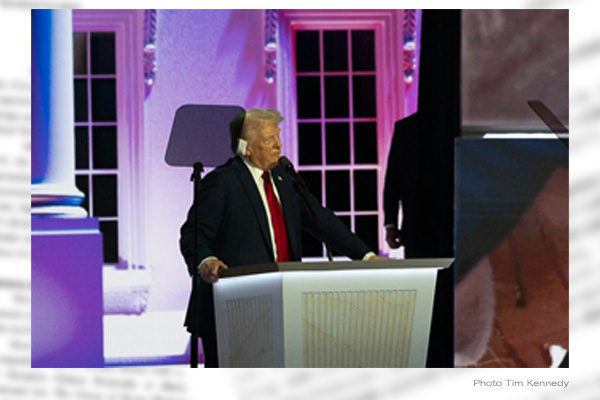As former President Donald Trump and incumbent Vice President Kamala Harris are expected to vie for the U.S. presidency in the November election, the potential outcome is attracting global attention. Harris may basically take over the incumbent Biden administration’s policies. Many wonder what would happen if the Trump presidency comes back. Let’s look at the economic impacts of Trump’s return.
At the Republican National Convention on July 18, Trump delivered a speech to accept the party’s nomination as the presidential candidate. Economic policies mentioned in the speech were mostly in line with earlier predictions: ending the inflation crisis, lowering interest rates, cutting taxes on a large scale, and raising tariffs (to 10% in general and at least 60% for Chinese goods).
These policies are strongly electioneering in nature, so that their simple assessment may end up being too superficial. So, let’s broaden our perspective for a deeper analysis.
Enclosure of semiconductor and other key industries
The economic features of Trump’s “America First” policy are the “enclosure” of key industries and protectionism. The United States used to reject industrial policy of government intervention in industry, but is now boldly turning to government intervention in the face of the Chinese threat. Furthermore, the industrial policy is protectionist and causes frictions with allies.
One of the key players is vice-presidential nominee J.D. Vance, who is considered a hardliner against China. Vance emphasizes industrial policy to bring key industries back into American soil. Former U.S. Trade Representative Robert Lighthizer, who is expected to join a second Trump administration, should also be watched closely. What would they try to get in negotiations with allies and other countries by threatening to impose a 10% tariff?
Their targets may not be limited to the automotive industry, which is traditionally subject to political intervention. The semiconductor industry could also emerge as a target. Trump insists that Taiwan has taken the semiconductor industry from the U.S. It is noted that he may press Taiwan to bring semiconductor production plants to the U.S. in connection with the defense burden. This is not somebody else’s problem for Japan. Competitive Japanese manufacturers of semiconductor materials and equipment may be requested to build plants in the U.S. While Japan-U.S. cooperation is important, it should not lead to the hollowing out of Japanese industries through the U.S. enclosure of key industries.
Energy policy will flip around
Trump will promote fossil fuel drilling, reversing the Biden administration’s energy policy that has been put under heavy environmentalist influence. The policy split is deep, as it is due to differences in the basic stances of Democrats and Republicans. A future Democratic administration will make another U-turn.
Japan must not be pushed around each time. We must not let the policy axis of “how to secure our fragile energy security” waver.
International cooperation at risk
Frameworks of international cooperation that have been built up will also be at risk.
As Trump has once hinted at withdrawing from the World Trade Organization, the WTO could become decisively dysfunctional.
Trump is also likely to withdraw from the Indo-Pacific Economic Framework that has been launched with a bang by the Biden administration. As was the case with the Trans-Pacific Partnership agreement from which Trump withdrew in the past, Japan needs to take the lead in holding Asian countries together.
Europe takes the possibility of a Trump administration’s revival even more seriously. It will accelerate “strategic autonomy” from the U.S. not only on the security issue but in the economic field. Here too, it is important for Japan to play a role as the glue.
Masahiko Hosokawa is a professor at Meisei University and a former director-general of the Trade Control Department at Japan’s Ministry of Economy, Trade and Industry. He is also a Planning Committee member at the Japan Institute for National Fundamentals.


